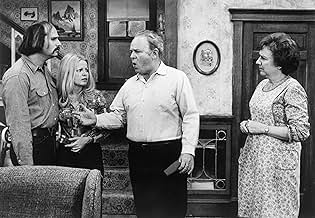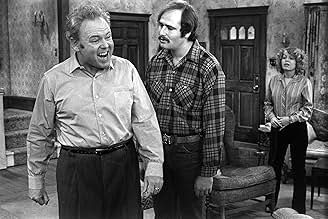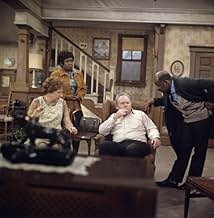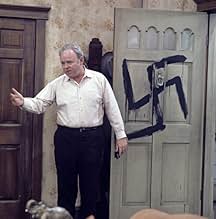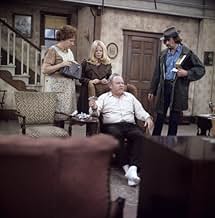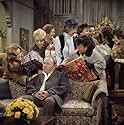Un hombre de clase trabajadora pelea constantemente con su familia sobre los temas importantes del día.Un hombre de clase trabajadora pelea constantemente con su familia sobre los temas importantes del día.Un hombre de clase trabajadora pelea constantemente con su familia sobre los temas importantes del día.
- Ganó 22 premios Primetime Emmy
- 47 premios y 74 nominaciones en total
Reseñas destacadas
Besides broaching all of the controversial topics of the day - abortion, the Vietnam War, homosexuality, and race relations, the show dared to say something that was seldom said on stage or screen before - that bigotry and racism thrived north of the Mason Dixon line, and found particularly safe harbors in some of the urban areas of what is normally thought of as the heart of liberalism. In this case, the Bunker household is in Queens, New York.
The year is 1971, and before outsourcing is even a word, Archie Bunker is able to maintain a middle class lifestyle in New York City with a blue collar job and a stay-at-home wife, Edith. He will never be anything more than he is right then. Archie holds very conservative though not well thought out - or at least not well articulated - viewpoints. And then his 18 year old daughter Gloria marries a liberal. Mike is an atheist with a Polish Catholic background, and stands for everything Archie is against. The icing on the cake - he's a penniless student and he will be a guest in Archie's home for the next several years while he finishes the university degree that will enable him to look down on Archie forever afterwords. It's funny this last point is brought up only once, by the observant if subservient Edith, Archie's wife.
For a few seasons all was well, and then this show and MASH suffered a series of crushing blows - the Vietnam War ended, Nixon was disgraced, and the controversial views held by Archie's son-in-law Mike began to enter the mainstream. Thus the show had to come up with new angles to stay fresh, and it did that, even managing to negotiate the loss of three of the four main characters and a neighboring family that played an important supporting role, the African-American Jeffersons.
Today it looks somewhat tie-dyed, but it's still worth studying just to see mainstream viewpoints change before your eyes.
Carroll O'Connor's portrayal of Archie Bunker was electrifying to watch because the show had such a good content of the day's relevant issues(which were strictly taboo from TV before this show ever hit the airwaves) mixed with some slapstick and of course Archie's mouth and logic. It had subjects that were tackled head on including homosexuality,gender roles,racism,war, economy,women's rights,and the choice of abortion(which one episode dealt with that subject),suicide,and birth control, education,child custody and old age.
Even when the commentary of certain items were brought up in the Bunker home,it was always Archie and Micheal(played by Rob Reiner)who quarrel over certain issues in which Archie calls Micheal either a "meathead",or "polark" because of his European heritage,which in turn made Archie one of the most bigotists people ever made for television.
Its very informative that the commentary on life in America is sometimes light-hearted in a sense,but brings out the bigot in all of us,and makes us think very hard on what we're doing to ourselves and each other.
The show itself had some very powerful episodes here,including one where Edith loses a loved one over his gender(which Jean Stapleton won the emmy for that compelling episode),and the part where Archie falls apart over the death of his wife(very emotional and powerful episode in which Carroll O'Connor won two emmys for his work as Best Actor on the show,and one for Sally Struthers and Rob Reiner as well).
During its initial run on CBS(as "All In The Family" from 1971-1979,and as "Archie Bunker's Place" from 1979-1982),the show as a whole has a very strong significance and content that applies still to this day,and one of the most influential shows ever to come out of the golden decade of great TV: the 1970's. Kudos to Carroll O'Connor and Jean Stapleton,wherever you are!
Catch the classics episodes on TV Land and Nick at Nite.
Adding other dimensions to the series are their neighbors, the Jeffersons (whose race frequently causes Archie to put himself in trouble with his ethnically-based comments), and, of course, among others, Cousin Maude-- Edith's no-nonsense cousin who shows up every so often just to push Archie's buttons. The writing is always fresh, the humor works nearly every time, and it's an absolute joy to see the cast at work-- the chemistry is perfect.
I really wish they could make a sitcom like this that actually works again.
¿Sabías que...?
- CuriosidadesNotoriously, the first toilet flush in American prime time television was heard on this show.
- PifiasIn the season 8 episode "Mike's New Job", Mike accepts a position in Los Angeles, and will move out of the house they are renting from the Jeffersons. George then arrives announcing that he has sold the house, and asks that Mike and Gloria move immediately, However, in the season 9 episode "The Family Next Door", Louise arrives at the Bunkers and tells Edith that they are renting out the house to Ed and Polly Lewis...The same house that they sold the season before.
- Citas
Mike Stivic: Why couldn't they say "Buddha, bless you" in Chinese?
Archie Bunker: Because they don't say that, that's why. If they say... Well, if they say anything at all, it's "Sayonara".
Mike Stivic: That's Japanese.
Archie Bunker: Same thing.
Mike Stivic: It's not the same thing!
Archie Bunker: What are you talking about? You put a Jap and a Chink together, you gonna tell me which is which?
Mike Stivic: That's right, because I find out about them. I talk to them as individuals.
Archie Bunker: Sure you talk to them. You say, "Which one of you guys is the Chink?"
Mike Stivic: [yells] I don't believe this. He's making me crazy!
- Versiones alternativasIn later seasons of the show, the theme song was re-recorded with Edith Bunker (Jean Stapleton) more clearly enunciating the line "Gee, our old LaSalle ran great!"
- ConexionesEdited into Todo en familia: The Best of All in the Family (1974)
Selecciones populares
- How many seasons does All in the Family have?Con tecnología de Alexa
Detalles
- Fecha de lanzamiento
- País de origen
- Idioma
- Títulos en diferentes países
- Justice for All
- Localizaciones del rodaje
- Empresa productora
- Ver más compañías en los créditos en IMDbPro
- Duración30 minutos
- Color






